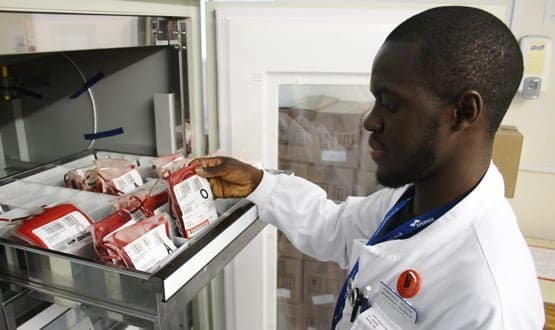Oxford cuts blood cost with e-requesting
- 16 July 2015

Oxford University Hospitals NHS Trust saved £500,000 in the cost of blood products over a year after implementing an electronic blood requesting system.
The trust believes it is the first in the country to have a fully paperless system for clinicians to order blood products, including decision support.
Consultant haematologist at Oxford University Hospitals Mike Murphy told Digital Heath News the trust saw the implementation of the Cerner Millennium electronic patient record in 2011 as an opportunity to develop an electronic blood requesting system.
A Millennium module for blood ordering was already in use in the US, but had not been implemented in the NHS. Oxford went live in April last year in haematology and the system is being rolled out across the trust. The final departments will be done by October.
Rather than using a pink paper request form, doctors use the EPR to request blood products and must provide justification for the transfusion.
The system automatically checks the patient’s current haemoglobin level and if it is too high, sends an alert to the doctor telling them and asking if they want to cancel or continue with the order.
This means the transfusion department can feed data back to departments about their use of blood products for particular procedures or conditions and adherence with nationally agreed transfusion triggers.
Before implementation, the trust’s compliance with agreed triggers was as low as 40%. This means up to 60% of transfusions were potentially unnecessary or even potentially putting patients at risk, explained Murphy.
Oxford is now at more than 90% compliance for both red blood cells and platelets transfusions within its haematology department.
The number of red blood cell transfusions has been reduced by 11%, while nationally usage has only reduced by 2-3%.
For platelets, the national trend in usage has been upwards by 1.3%, while at Oxford it has reduced by 13%.
This translates into a lot of money as each red blood cell unit costs £122 and platelets costs £200. Oxford has so far saved £500,000 in the cost of blood products over the past year.
“Every month we collect the data and have meetings with the doctors and go through the results and show the transfusions that have been given that probably shouldn’t have been given,” said Murphy.
“It’s key to do feedback and education, we need to do that to show we are looking and will be following up with them.”
Murphy said some other trusts have been struggling with business cases to implement a similar system, but now that the return on investment is clear, it should become easier.
Read more about Oxford's electronic blood transfusion system and e-prescribing in Insight.




